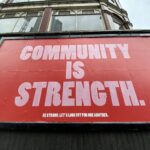Editor’s Note: This week’s guest contributor is Mark Docken, a friend, neighbor and retired Lutheran pastor. Mark invites us all to deeper reflection on the challenges of being welcoming and loving to all.
TJ Klune writes in “The House in the Cerulean Sea” about magical children who are segregated from society because their differences are seen as dangerous and in need of regulation and prescribed assimilation. Thomas Page McBee writes in Amateur, a memoir of his journey as a transgender male: “It is not easy to face the long shadow of assimilation in the United States, which is as old as the nation itself. It is so much a part of our national history to pretend to be what we are not in our striving that many of us no longer see what we have lost.”
We often live with conflicting yearnings. On one hand to be who we are and on the other hand to assimilate into a larger group. The hope to be who we are comes from the unique treasure each of us is. The drive to assimilate arises from wanting to belong, and to be accepted by others. We want to both be celebrated for our uniqueness, for who we are, and we want to celebrate our oneness with others. We would hope that those are not in conflict. But because of our broken humanity, often they are.
It seems that society/culture has a need for some sense of order and structure in our world and in our living. That often translates into norms and mores based on majority rule, or long-standing traditions set by those in power. Unfortunately, that can lead to making judgments as to what is normal and what isn’t and extends to what is better and what is worse, what is good and what is bad. It often results in the establishment of stark binaries.
If others perceive us as not “normal,” we can be tempted to believe it, feel forced to assimilate, or pass as normal. We do this to earn possible rewards of popularity, status advancement, economic gain, or to avoid persecution, oppression, and even violence.
But there is a loss when this happens. Personally, there is a loss in leaving behind part of one’s own identity. Children of immigrants speak of this later in their lives. They describe their sense of loss when they denied the culture of their parents to become more American. This also happens in regards to race and gender. Such loss of self can lead to depression and mental illness. Elliot Page poignantly refers to this in a quotation from his TV series “The Umbrella Academy”: “Some of us don’t get to have the life we want. That doesn’t mean we don’t want it.”
But there is also loss to the wider community. The wider community loses the gifts of different cultures, different life experiences, different perspectives. Gender diversity can gift society with less rigid gender roles and expectations. Transgender authors Elliot Page and Thomas Page McBee give insights into toxic masculinity. *
A very disturbing and hurtful shadow side of this pressure toward assimilation is that such a demand also requires there to be groups that are designated as outsiders/inferiors/untouchables- those who are forbidden to assimilate. It seems that much of the assimilation of immigrants was done at the expense of people of color. One wanted to pass as “white” in order to avoid the oppression of people of color. Or for many, to pass as a “real” man one had to dehumanize males who were gay or trans, and even dehumanize women. Too often, assimilation leads to a denial of another’s very personhood.
When I start to see the hurtful consequences of assimilation, I also begin to see its pervasiveness. It is most tragically hurtful in areas of race, culture, and gender, but none of us escapes it entirely. For a long time, I tried to “pass” as a true believer because that was” expected” of a pastor and so I lost the gift of questions and doubts in my faith. I believe we all succumb to the temptation of trying to appear as we are not, in order to avoid ridicule or achieve gains. And I believe we have categorized others without knowing them, in order to keep a comfortable order in our lives. To some degree, the brokenness of our society means “we don’t get to have the lives we want.”
As we move forward with more and more diversity becoming more visible, we need to work hard to find a balance between providing mutual flourishing for everyone, and also fulfilling the need for societies to have some common structures and identity upon which to function. We need to find ways to both acknowledge that there are some predominate ways of being and becoming while not having that be required for everyone. Maybe there should be, instead, a center from which to diverge and grow. Our goal must be that all might flourish, being who they are, living the lives they want. In the end, this will be for the good of all.
*Thomas Page McBee, Amateur, p. 127. Quoting Niobe Way “If being ‘feminine’ is the opposite of being a man, then many qualities that Americans associate with women (such as empathy, which shows up in boys as well as girls) are not just frowned upon, but destroyed in boyhood. If you’re only a man by not being a woman,” Way told me, “that’s basing someone’s humanness on someone else’s dehumanization.”




Amen! Thank you for this perspective on assimilation that I had not considered. I am grateful.
Thanks Shirin, indeed I had not considered the personal and community challegnes to open our minds about trans people and to let go of our melting pot theories. Best, Tom